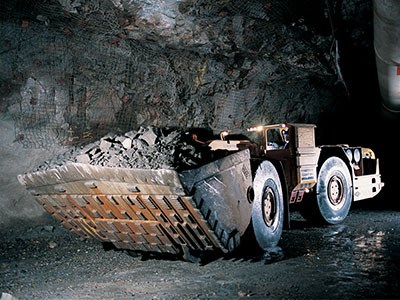A recent drop in the price of nickel should not have a major impact on Sudbury's mining supply and services sector, said the executive director of the Sudbury Area Mining Supply and Service Association.
“Fluctuations in nickel prices don't seem to alarm many of our guys,” said Dick DeStefano. “They just accept it as part of the process of working in the Sudbury area with nickel mines.”
The price of nickel was US$7.71 a pound Tuesday, after a drop from nearly $9 a pound in early September.
DeStefano said many of his association's members have learned to diversify, providing services and products for a variety of different mining companies.
Even if production at a mine slows, companies like Vale and Glencore still need to maintain their equipment and pay for many of the services on which they rely on a regular basis, DeStefano added.
He said other issues have had a bigger impact on his sector.
“The biggest issue for our guys is that there's such a lack of exploration going on,” DeStefano said.
He said uncertainty around the Ring of Fire has also been like a “dark cloud” hanging over the mining supply and services sector.
“We never know what's going to happen,” he said.
In July, Scotiabank commodity market specialist Patricia Mohr told NorthernLife.ca she expected nickel to reach an average price of US$10.75 per pound by 2015.
The prediction was due to a ban on all exports of nickel-containing ores Indonesia enacted on Jan. 12, 2014.
The country's two dominant political parties supported the ban to give local nickel producers time to build processing facilities – with help from Chinese investments.
“The ore was essentially being dug out of the ground and shipped in bulk,” Mohr said. “What they were getting in terms of value-added was very small.”
With 11 processing plants scheduled for construction, Indonesia will be able to sell processed nickel to China at a higher rate of return than its unprocessed ore.
In the meantime – and it could take years before the processing plants are up and running – the ban has driven Chinese buyers to search elsewhere for nickel, and has driven up prices.
Mike Dragosits, a senior commodity strategist with TD Securities, said he has been less bullish on nickel prices.
Dragosits said Indonesia's president elect, Joko Widodo, is expected to loosen the country's export ban after he takes office in October.
But the main reason nickel prices took a tumble this week, said Dragosits, was because China's economy has not performed as well as expected.
“The China story is changing a bit,” he said. “The demand side is probably not going to be as strong as we had expected three or four months ago.”
Dragosits said he does not expect a big rebound in nickel prices until next year, or the year after.
A recent drop in the price of nickel should not have a major impact on Sudbury's mining supply and services sector, said the executive director of the Sudbury Area Mining Supply and Service Association.
“Fluctuations in nickel prices don't seem to alarm many of our guys,” said Dick DeStefano. “They just accept it as part of the process of working in the Sudbury area with nickel mines.”
The price of nickel was US$7.71 a pound Tuesday, after a drop from nearly $9 a pound in early September.
DeStefano said many of his association's members have learned to diversify, providing services and products for a variety of different mining companies.
Even if production at a mine slows, companies like Vale and Glencore still need to maintain their equipment and pay for many of the services on which they rely on a regular basis, DeStefano added.
He said other issues have had a bigger impact on his sector.
“The biggest issue for our guys is that there's such a lack of exploration going on,” DeStefano said.
He said uncertainty around the Ring of Fire has also been like a “dark cloud” hanging over the mining supply and services sector.
“We never know what's going to happen,” he said.
In July, Scotiabank commodity market specialist Patricia Mohr told NorthernLife.ca she expected nickel to reach an average price of US$10.75 per pound by 2015.
The prediction was due to a ban on all exports of nickel-containing ores Indonesia enacted on Jan. 12, 2014.
The country's two dominant political parties supported the ban to give local nickel producers time to build processing facilities – with help from Chinese investments.
“The ore was essentially being dug out of the ground and shipped in bulk,” Mohr said. “What they were getting in terms of value-added was very small.”
With 11 processing plants scheduled for construction, Indonesia will be able to sell processed nickel to China at a higher rate of return than its unprocessed ore.
In the meantime – and it could take years before the processing plants are up and running – the ban has driven Chinese buyers to search elsewhere for nickel, and has driven up prices.
Mike Dragosits, a senior commodity strategist with TD Securities, said he has been less bullish on nickel prices.
Dragosits said Indonesia's president elect, Joko Widodo, is expected to loosen the country's export ban after he takes office in October.
But the main reason nickel prices took a tumble this week, said Dragosits, was because China's economy has not performed as well as expected.
“The China story is changing a bit,” he said. “The demand side is probably not going to be as strong as we had expected three or four months ago.”
Dragosits said he does not expect a big rebound in nickel prices until next year, or the year after.




